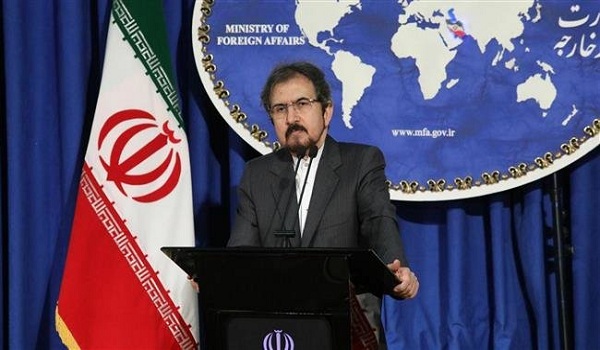Iran has rejected US Secretary of State Mike Pompeo’s claims against its missile capabilities, saying the program is defensive and does not violate the international agreement on Tehran’s nuclear program.
“Iran’s missile program has a defensive nature and is designed according to the needs of the country,” Foreign Ministry spokesman Bahram Qassemi said Sunday, responding to Pompeo’s claim that Tehran had tested a medium-range ballistic missile.
Pompeo claimed in a statement released on Twitter Saturday that Iran was increasing its “testing and proliferation” of missiles and called on the Islamic Republic to “cease these activities.”
The test, he said, “violates UNSCR 2231,” citing the United Nations Security Council’s endorsement of the international nuclear agreement which the United States abandoned in May.
“No resolution at the Security Council has banned Iran’s missile program or missile tests,” Qassemi said as he roasted Washington over its decision to pull out of the Joint Comprehensive Plan of Action (JCPOA( .
“What is interesting and, of course, ridiculous is that you are citing a resolution which you have not only violated with your unilateral and illegal withdrawal from the JCPOA, but also are encouraging others to violate it or even threaten to punish and sanction those who implement it,” he added.
UN Security Council Resolution 2231 “calls on” Iran “not to undertake any activity related to ballistic missiles designed to be capable of delivering nuclear weapons, including launches using such ballistic missile technology.”
Tehran has always emphasized that it has no nuclear warheads and that none of its missiles have been designed to carry nuclear weapons.
The International Atomic Energy Agency (IAEA) has repeatedly confirmed Iran’s compliance with the accord.
Back in May, US President Donald Trump pulled his country out of the JCPOA despite objections from the other signatories to the nuclear deal.
Since then, Washington has imposed “toughest ever” sanctions against Iran. It has also warned of severe penalties for the companies that evade the bans and engage in business with Iran.
However, the European parties to the JCPOA have vowed all-out efforts to save the agreement and protect their firms in the face of American bans.
They are now working to set up the so-called Special Purpose Vehicle (SPV) in a bid to circumvent the US sanctions against Iran and facilitate non-dollar trade with Tehran.
PRESS T.V
R.S

